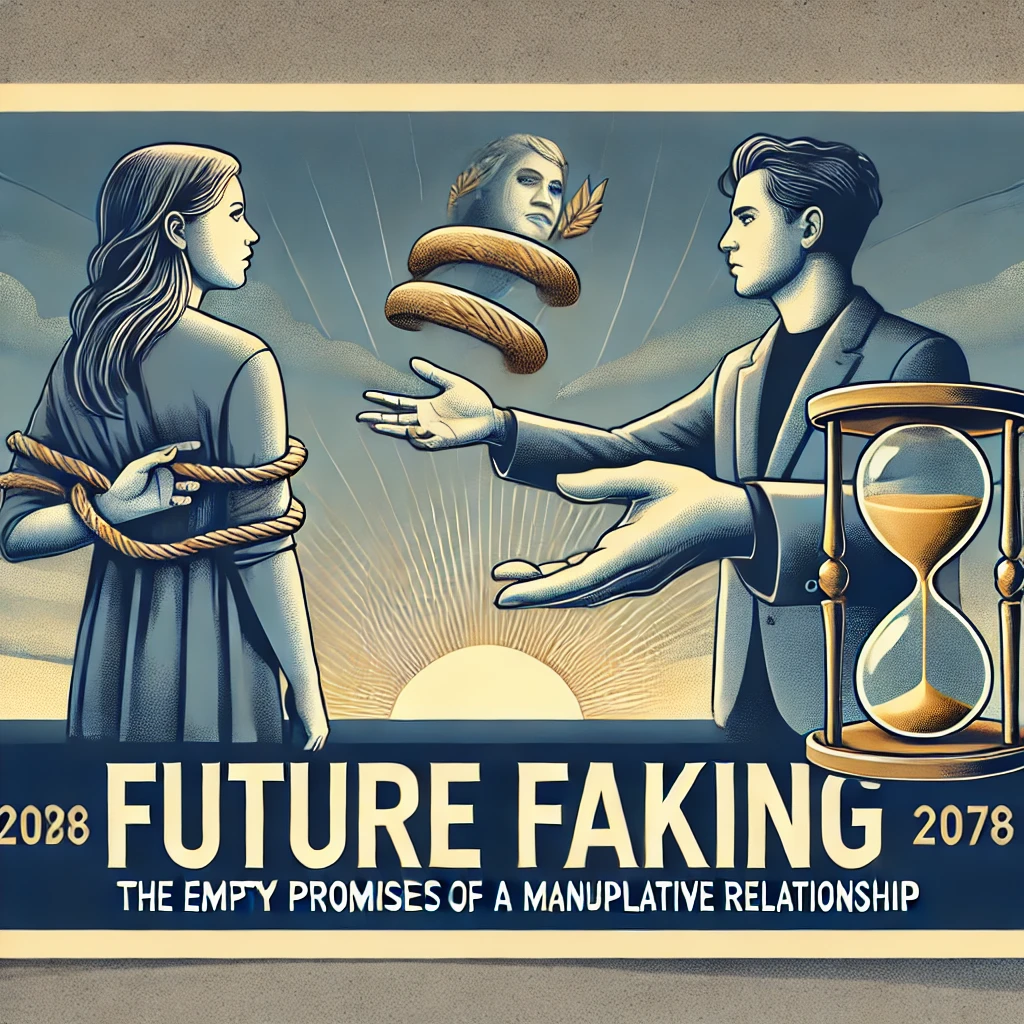Imagine this: You’ve just started dating someone new, and everything feels perfect. They’re already talking about a future together—making plans for a dream vacation, discussing what your life will look like years from now, and hinting at marriage or building a home. It sounds ideal, almost too good to be true. The problem is, it is too good to be true. What you’re experiencing could be future faking, a manipulative tactic where one person makes grand promises about the future with no intention of following through.
In “Mastering Him: The Secret Art of Gentle Control in Relationships”, Chapter 8 delves deep into future faking, revealing how this tactic is used to hook someone emotionally, often to gain control or keep them invested in a relationship that may not be as secure or committed as it seems. Future faking gives the illusion of deep commitment, but in reality, it’s just a manipulation tactic to keep the other person engaged—dangling the hope of a future that will never come to fruition.
This blog will explore what future faking is, why it’s so effective, and how to recognize when it’s happening in your relationship. By the end, you’ll understand how this tactic works and how to protect yourself from being misled by empty promises.
What Is Future Faking?
Future faking occurs when one partner makes grand promises about the future to keep the other person invested in the relationship, all while having no real intention of following through. It’s a form of emotional manipulation designed to create an illusion of commitment, intimacy, and a shared future. The future faker may talk about getting married, buying a house together, having kids, or going on dream vacations, but these promises are often made to maintain control or prevent the other person from leaving.
In reality, the future faker has no plans to make any of these dreams a reality. Instead, they use these promises as bait to keep their partner emotionally hooked, always looking forward to the next step in the relationship. This tactic can be incredibly confusing and frustrating for the person being manipulated, who might feel like they’re constantly waiting for the relationship to “progress” while nothing actually changes.
Why Does Future Faking Work?
Future faking works because it taps into the human desire for security, stability, and a shared future. When someone you care about starts talking about long-term plans—whether it’s marriage, moving in together, or even something as simple as a vacation—it can make you feel like the relationship is heading toward a deeper level of commitment. The excitement and anticipation of a future together can strengthen your emotional attachment, making you more likely to overlook red flags or tolerate current issues in the hope that things will improve down the line.
This tactic is especially effective in the early stages of a relationship, where emotions are high, and both partners are still getting to know each other. The future faker creates a sense of security and investment, even though their actions may not align with their words.
Real-Life Examples of Future Faking in Relationships
Let’s explore some real-life scenarios where future faking might show up in relationships. These examples will help you recognize how future faking can be used to manipulate emotions and keep someone hooked on the idea of a future that may never come.
Example 1: The Illusion of Commitment
You’ve been dating someone for a few months, and everything seems to be going well. They’re constantly talking about how you’ll eventually get married, move in together, and start a family. You haven’t seen much progress in the relationship—no talk of actual plans to move forward—but their constant mention of these future events keeps you hopeful.
Future Faking in Action:
Your partner says things like, “I can’t wait until we’re living together. We’ll have the perfect place, and we’ll spend every evening cooking dinner together. It’s going to be amazing.” But when you try to discuss concrete steps to make this happen, they avoid the conversation or make excuses for why now isn’t the right time. It feels like the dream is always just out of reach.
Why It Works:
By painting an ideal picture of the future, your partner makes you feel secure in the relationship—so much so that you may overlook the fact that nothing is changing in the present. You remain invested in the promise of what’s to come, even though there’s no actual progress being made.
Example 2: The Promise of Marriage
One of the most common forms of future faking involves promising marriage, but with no real intention of making it happen. This tactic can keep a partner waiting for years, holding onto the hope of an engagement that never materializes.
Future Faking in Action:
Your partner frequently says things like, “I know you’re the one, and we’re definitely going to get married. I’m just waiting for the right time to propose.” You feel reassured by these promises, but months (or even years) go by, and there’s no proposal, no ring, and no real discussion about wedding plans.
Why It Works:
By dangling the prospect of marriage in front of you, your partner keeps you emotionally invested in the relationship, even though they have no immediate intention of following through. The promise of marriage keeps you committed and hopeful, making it harder for you to walk away.
Example 3: The Fantasy Vacation
Another common example of future faking is when one partner promises an extravagant trip or vacation as a way to keep their partner engaged. These promises often sound exciting but remain vague and far off, with no actual plans being made.
Future Faking in Action:
Your partner tells you, “We should totally plan a vacation to Bali. We’ll spend two weeks there, just relaxing and enjoying life together. It’ll be the perfect getaway.” But when you try to nail down details—like dates, flights, or even saving money for the trip—they dodge the conversation or come up with reasons why now isn’t the right time to plan it.
Why It Works:
The promise of an exciting vacation creates anticipation and gives you something to look forward to, even though there’s no real plan in place. Your partner uses the idea of the trip to keep you invested in the relationship, but the vacation never actually happens.
Example 4: The Promise of Financial Security
In some cases, future faking involves promises about financial stability or success—such as buying a house, starting a business together, or reaching a certain financial goal as a couple. These promises are often grand and idealistic but lack any real foundation.
Future Faking in Action:
Your partner constantly talks about how they’re working hard to secure your future together, saying things like, “Once I get this promotion, we’ll be able to buy our dream home. Just hang in there a little longer, and we’ll be set for life.” However, the promotion never seems to come, and their financial situation remains the same. Despite the promises, there’s no real progress toward the goals they’ve outlined.
Why It Works:
By focusing on future financial success, your partner keeps you invested in the relationship with the hope that things will improve. You may overlook current financial issues or instability because you believe there’s a better future ahead—one that’s always just out of reach.
How to Recognize Future Faking in Relationships
If you suspect that future faking might be happening in your relationship, here are some signs to watch for:
- Grand promises without follow-through: Your partner frequently talks about big plans for the future—such as marriage, vacations, or moving in together—but there’s little to no progress toward making those plans a reality.
- Avoiding concrete plans: When you try to discuss specific steps to achieve the future they’ve promised, your partner becomes vague, avoids the conversation, or makes excuses for why now isn’t the right time.
- Emotional investment without real progress: You find yourself holding onto the idea of a future together, even though the relationship hasn’t actually progressed in a meaningful way.
- Constant future talk: Your partner talks more about the future than the present, using it as a way to keep you hooked without addressing current issues in the relationship.
How to Respond to Future Faking
If you’re dealing with a partner who engages in future faking, it’s important to protect yourself from getting caught up in empty promises. Here’s how to respond:
- Ask for Specifics: When your partner makes a grand promise about the future, ask for concrete details. “That sounds great, but what steps can we take to make that happen? Can we set a timeline?”
- Focus on the Present: Shift the focus away from future promises and back to the present. “I’m excited about the idea of us getting married, but right now, I’d like to focus on how we can strengthen our relationship in the present.”
- Look for Consistency: Pay attention to whether your partner’s actions match their words. Are they taking real steps toward the future they’ve promised, or are they just talking about it?
- Set Boundaries: If future faking becomes a recurring issue, set clear boundaries around what you’re willing to tolerate. “I need us to be realistic about our future. If we’re not making progress toward the goals we’ve discussed, I need to reevaluate where this relationship is going.”
Q&A
- What is future faking in a relationship?
- Explains the concept and signs of future faking, appealing to readers curious about relationship red flags.
- How do you recognize future faking?
- Provides a quick guide to spotting future faking, addressing readers who suspect they may be experiencing it.
- Why do people engage in future faking?
- Delivers insights into the motivations behind future faking, a common search for understanding manipulative behaviors.
- What are examples of future faking?
- Offers relatable scenarios of future faking in relationships, helping readers identify patterns in their own lives.
- Is future faking a form of emotional manipulation?
- Explores whether future faking qualifies as manipulation, a question that clarifies boundaries for readers.
- How does future faking affect relationships?
- Discusses the emotional impact of future faking, appealing to readers seeking clarity on relationship dynamics.
- Can future faking be unintentional?
- Addresses whether future faking can occur without intent, adding nuance for readers curious about gray areas.
- How do I confront a partner who is future faking?
- Provides practical advice on addressing future faking with a partner, attracting those in similar situations.
- What are the long-term effects of future faking?
- Explains the potential lasting impacts on trust and emotional well-being, appealing to readers looking for deeper understanding.
- How can I protect myself from future faking?
- Offers actionable steps to avoid or respond to future faking, ideal for readers prioritizing self-protection.
Ready to Master the Art of Influence in Your Relationship?
If you’re ready to dive deeper into the world of subtle manipulation tactics like future faking and learn how to navigate these emotional dynamics with confidence and clarity, then **”Mastering Him: The Secret Art
of Gentle Control in Relationships”** is your ultimate guide. In Chapter 8, you’ll discover how to identify manipulative behaviors, respond effectively, and create a relationship dynamic built on trust and authenticity.
This book isn’t just about understanding manipulation—it’s about mastering the art of influence in a way that builds trust, connection, and emotional intelligence. Get your copy today and start taking control of your relationship dynamics with confidence—because understanding influence is the key to creating lasting harmony and connection.
Read more about the book: https://developmentpill.com/mastering-him-the-secret-art-of-gentle-control-in-relationships-a-guide-to-influence-hell-never-see-coming/
Book Link: https://www.amazon.com/dp/B0DKKGLZQ9
Book Link UK: https://www.amazon.co.uk/dp/B0DKKGLZQ9



